-
Countries
-
Data and Analysis
-
Special Focus
-
Crisis Responses
Return migration

Contact
DTM South Sudan, SouthSudanDTM@iom.int
Language
English
Location
South Sudan
Period Covered
Feb 01 2020
Dec 31 2020
Activity
- Flow Monitoring
Building on its global expertise in emergency data collection systems, including in response to previous infectious disease outbreaks, IOM’s Displacement Tracking Matrix (DTM) has been monitoring the impact of COVID-19 travel restrictions on human mobility on a global scale. In South Sudan, DTM has been implementing flow monitoring and remote assessments at points of entry to ‘inform the wider response by generating and analysing information on mobility’, a strategic priority set out by the National COVID-19 Response Plan for the Points of Entry pillar. This report makes use of flow monitoring data to analyse the short and medium term impact of COVID-19 travel restrictions on cross-border mobility.
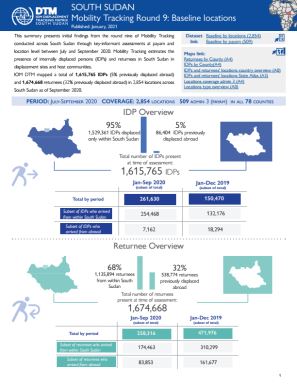
Contact
DTM South Sudan, SouthSudanDTM@iom.int
Language
English
Location
South Sudan
Period Covered
Jul 01 2020
Dec 31 2020
Activity
- Mobility Tracking
- Baseline Assessment
This summary presents initial findings from the ninth round of Mobility Tracking conducted across South Sudan through key-informant based assessment at payam and location level between July and September 2020. Mobility Tracking quantifies the presence of internally displaced persons (IDPs) and returnees in South Sudan in displacement sites and host communities. IOM DTM mapped a total of 1,615,765 IDPs (5% previously displaced abroad) and 1,674,668 returnees (32% per cent from abroad) in 2,854 locations across South Sudan.

Contact
REMAP Dhaka Support Team REMAPBD@iom.int
Language
English
Location
Bangladesh
Period Covered
Aug 01 2020
Sep 30 2020
Activity
- Mobility Tracking
- Baseline Assessment
As the COVID-19 pandemic emerged globally, migrant workers, both internationally and within Bangladesh, found themselves facing a new set of challenges and vulnerabilities. With limited access to income-generating activities, social services, healthcare systems, and social support networks, many have opted to return home. During August and September 2020, IOM conducted a second round of data collection, supported by the European Union under the regional program REMAP and in coordination with the Research and Policy unit of the Ministry of Expatriates’ Welfare and Overseas Employment, Bangladesh, along with the NPM team based in Cox’s Bazar, to further enhance the understanding of economic impacts and relevant challenges related to COVID-19 in Bangladesh while focusing on a longitudinal perspective and analysis.

Contact
DTM South Sudan, SouthSudanDTM@iom.int
Language
English
Location
South Sudan
Period Covered
Dec 01 2020
Dec 31 2020
Activity
- Flow Monitoring
DTM’s Flow Monitoring Registry (FMR) surveys people on the move at key transit points within South Sudan (SSD) and at its borders. It provides an insight into mobility trends, migration drivers and traveller profiles to inform programming by humanitarian and development partners and by the government, complementing DTM’s monitoring of COVID-19 mobility restrictions. In total, 33 Flow Monitoring Points (FMPs) were active in December 2020, surveying internal flows and cross-border travel with Uganda (UGA), the Democratic Republic of Congo (DRC), Sudan (SDN), Ethiopia (ETH) and the Central African Republic (CAR). Activities at Renk North Checkpoint remained suspended in December due to ongoing insecurity. Figures are only indicative of existing trends among respondents at the active FMPs since DTM does not have full coverage of cross-border or internal flows. Participation in the survey is voluntary and anonymous.
Please click here to access the dataset.
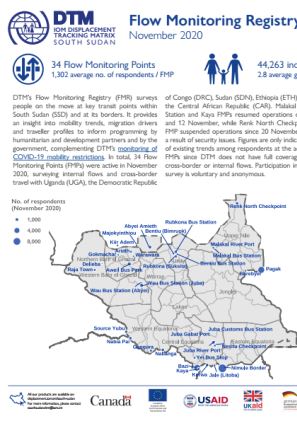
Contact
DTM South Sudan, SouthSudanDTM@iom.int
Language
English
Location
South Sudan
Period Covered
Nov 01 2020
Nov 30 2020
Activity
- Flow Monitoring
DTM’s Flow Monitoring Registry (FMR) surveys people on the move at key transit points within South Sudan (SSD) and at its borders. It provides an insight into mobility trends, migration drivers and traveller profiles to inform programming by humanitarian and development partners and by the government, complementing DTM’s monitoring of COVID-19 mobility restrictions. In total, 34 Flow Monitoring Points (FMPs) were active in November 2020, surveying internal flows and cross-border travel with Uganda (UGA), the Democratic Republic of Congo (DRC), Sudan (SDN), Ethiopia (ETH) and the Central African Republic (CAR). Malakal Bus Station and Kaya FMPs resumed operations on 3 and 12 November, while Renk North Checkpoint FMP suspended operations since 20 November as a result of security issues. Figures are only indicative of existing trends among respondents at the active FMPs since DTM does not have full coverage of cross-border or internal flows. Participation in the survey is voluntary and anonymous.
Please click here to access the dataset.
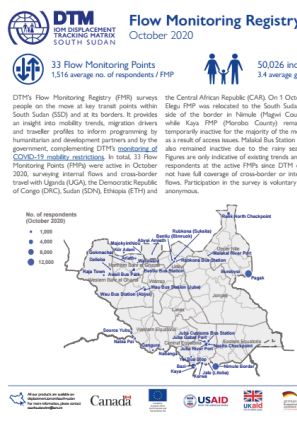
Contact
DTM South Sudan, SouthSudanDTM@iom.int
Language
English
Location
South Sudan
Period Covered
Oct 01 2021
Oct 31 2021
Activity
- Flow Monitoring
DTM’s Flow Monitoring Registry (FMR) surveys people on the move at key transit points within South Sudan (SSD) and at its borders. It provides an insight into mobility trends, migration drivers and traveller profiles to inform programming by humanitarian and development partners and by the government, complementing DTM’s monitoring of COVID-19 mobility restrictions. In total, 33 Flow Monitoring Points (FMPs) were active in October 2020, surveying internal flows and cross-border travel with Uganda (UGA), the Democratic Republic of Congo (DRC), Sudan (SDN), Ethiopia (ETH) and the Central African Republic (CAR). On 1 October Elegu FMP was relocated to the South Sudanese side of the border in Nimule (Magwi County), while Kaya FMP (Morobo County) remained temporarily inactive for the majority of the month as a result of access issues. Malakal Bus Station FMP also remained inactive due to the rainy season. Figures are only indicative of existing trends among respondents at the active FMPs since DTM does not have full coverage of cross-border or internal flows. Participation in the survey is voluntary and anonymous.
Please click here to access the dataset.
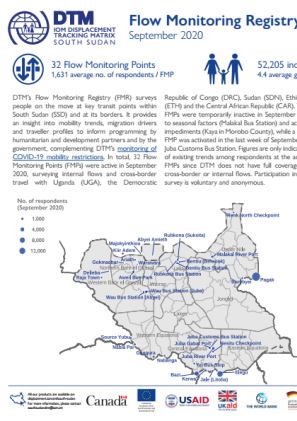
Contact
DTM South Sudan, SouthSudanDTM@iom.int
Language
English
Location
South Sudan
Period Covered
Sep 01 2020
Sep 30 2020
Activity
- Flow Monitoring
DTM’s Flow Monitoring Registry (FMR) surveys people on the move at key transit points within South Sudan (SSD) and at its borders. It provides an insight into mobility trends, migration drivers and traveller profiles to inform programming by humanitarian and development partners and by the government, complementing DTM’s monitoring of COVID-19 mobility restrictions. In total, 32 Flow Monitoring Points (FMPs) were active in September 2020, surveying internal flows and cross-border travel with Uganda (UGA), the Democratic Republic of Congo (DRC), Sudan (SDN), Ethiopia (ETH) and the Central African Republic (CAR). Two FMPs were temporarily inactive in September due to seasonal factors (Malakal Bus Station) and access impediments (Kaya in Morobo County), while a new FMP was activated in the last week of September at Juba Customs Bus Station. Figures are only indicative of existing trends among respondents at the active FMPs since DTM does not have full coverage of cross-border or internal flows. Participation in the survey is voluntary and anonymous.
Please click here to access the dataset.
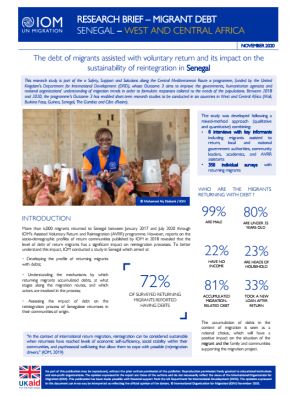
Contact
Regional Office Dakar, RODakar-DataResearch@iom.int
Language
English
Location
Senegal
Period Covered
Dec 19 2019
Jun 30 2020
Activity
- Other
- Survey
More than 6,000 migrants returned to Senegal between January 2017 and July 2020 through IOM’s Assisted Voluntary Return and Reintegration (AVRR) programme. However, reports on the socio-demographic profiles of return communities published by IOM in 2018 revealed that the level of debt of return migrants has a significant impact on reintegration processes. To better understand this impact, IOM conducted a study in Senegal which aimed at: developing the profile of returning migrants with debts; understanding the mechanisms by which returning migrants contracted debts, at which stages along the migration route, and which actors are involved in the process; and assessing the impact of debt on the reintegration process of returnees in their communities of origin. The study was developed following a mixed-method approach (qualitative and quantitative) combining :interviews with key informants including migrants assisted to return, local and national government authorities, community leaders, academics, and AVRR assistants; and individual surveys with returning migrants.
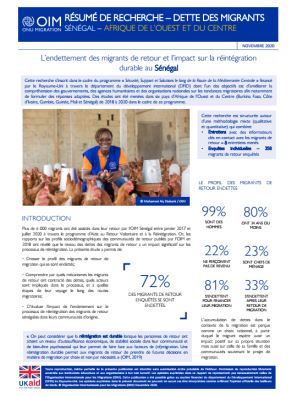
Contact
Regional Office Dakar, RODakar-DataResearch@iom.int
Language
French
Location
Senegal
Period Covered
Dec 19 2019
Jun 30 2020
Activity
- Other
- Survey
Plus de 6 000 migrants ont été assistés dans leur retour par l’OIM Sénégal entre janvier 2017 et juillet 2020 à travers le programme d’Aide au Retour Volontaire et à la Réintégration. Or, les rapports sur les profils sociodémographiques des communautés de retour publiés par l'OIM en 2018 ont révélé que le niveau des dettes des migrants de retour a un impact significatif sur les processus de réintégration. La présente étude a permis de : dresser le profil des migrants de retour de migration qui se sont endettés; Comprendre par quels mécanismes les migrants de retour ont contracté des dettes, quels acteurs sont impliqués dans le processus, et à quelles étapes de leur voyage le long des routes migratoires; Evaluer l’impact de l’endettement sur le processus de réintégration des migrants de retour maliens dans leurs communautés d’origine. Elle est structurée autour d’une méthodologie mixte (qualitative et quantitative) qui combine: entretiens avec des informateurs clés en contact avec les migrants de retour; et enquêtes individuelles.
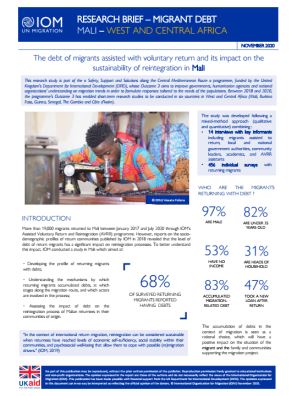
Contact
DTM Mali, DTMMali@iom.int
Language
English
Location
Mali
Period Covered
Feb 17 2020
Jul 17 2020
Activity
- Flow Monitoring
More than 19,000 migrants returned to Mali between January 2017 and July 2020 through IOM’s Assisted Voluntary Return and Reintegration (AVRR) programme. However, reports on the socio-demographic profiles of return communities published by IOM in 2018 revealed that the level of debt of return migrants has a significant impact on reintegration processes. To better understand this impact, IOM conducted a study in Mali which aimed at: developing the profile of returning migrants with debts; understanding the mechanisms by which returning migrants contracted debts, at which stages along the migration route, and which actors are involved in the process; and assessing the impact of debt on the reintegration process of returnees in their communities of origin. The study was developed following a mixed-method approach (qualitative and quantitative) combining :interviews with key informants including migrants assisted to return, local and national government authorities, community leaders, academics, and AVRR assistants; and individual surveys with returning migrants.
Pagination
- Previous page
- Page 25
- Next page
